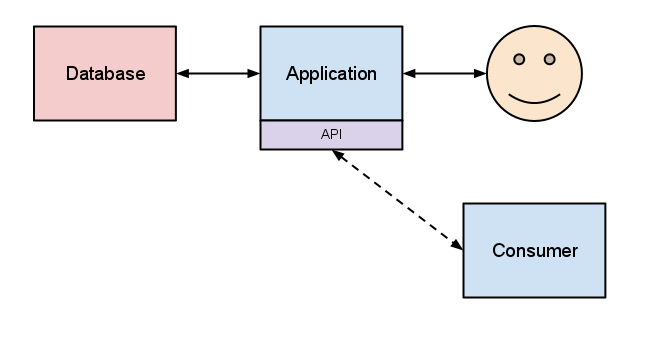This is a proposal for a paper at the Open Repositories 2012 conference in July.
The JISC-funded Orbital project is building on earlier work at the University of Lincoln to develop a state-of-the-art research data management infrastructure, piloted with the first purpose-built School of Engineering in the UK in over 20 years.
Orbital (figure c) differs from traditional database applications in three significant ways:
- Orbital Core uses MongoDB, a document-oriented, schema-less, so-called ‘NoSQL’ database. MongoDB offers flexibility in that it is capable of accepting an object representing any kind of data (e.g. tabular data, survey results, images) without the need to develop a schema beforehand. MongoDB also includes useful features which can boost performance and resiliency, namely sharding – slicing data across multiple servers so a request may be processed by multiple servers in parallel – and replication — keeping multiple identical copies of data on different servers in case one of them fails. Orbital is also designed to be able to spread the ‘core’ – the application which does the heavy lifting – and the ‘manager’ – the front-end user interface – across multiple servers without causing stress. In our experience MongoDB, combined with the Sphinx search engine to perform full-text searching, is also extremely fast and allows us to develop simple, attractive APIs which we can expose to user applications.
- Orbital Core mediates access to the data via an open source OAuth 2 server we have developed and implemented at Lincoln. The use of OAuth 2 allows access to the data from multiple authorised systems providing that the owner of the data has given permission, instantly opening the Orbital application to third-party extension. This method establishes the identity, authentication and authorisation of users, providing direct access to individual data sets or portions of data sets (e.g. specific rows/columns) through APIs on Orbital Core.
- The design and development of Orbital Core is API-driven, resulting in an application that offers 100% of its functionality through APIs, whether to our own Orbital Manager or a third-party application, each of which are treated equally by Orbital Core (figure c). As far as Orbital Core is concerned there is no functional difference between Orbital Manager (the front-end) and an application that a researcher has developed to meet a specific need; they are subject to the exact same access controls, restrictions, sanity checking and limitations. We have therefore eschewed some of the traditional approaches of building a database application, where access to the database is either provided via a stand-alone application (figure a) or via an API bolted on to the database (figure b). Orbital is also designed to be both stateless, i.e. all of the API functions are RESTful and thus represent a complete transaction with no requirement for session affinity, are not reliant on SQL features like transactions and joins, and have a reduced requirement for referential integrity.
Under this design, the API is the only way to interface with the data and functionality of the system. This API-driven approach offers several benefits:
- Architecture is better: We are forced to think about data types and methods early on. Consistent behaviour across the application is easier to achieve.
- Development is easier: Calling a well designed API is simple; error messages become cleanly captured by design; APIs encourage code reuse at both API and application end.
- Updates become simpler: We can run two or more API versions concurrently; tweak the API back-end and all front-end applications (‘official’ and 3rd party) benefit at once.
- The APIs are better: The APIs must include everything we want our application to be able to do. Reliability of the API is now critical which encourages better design of resiliency and error handling; and usability of the API is essential which encourages better documentation.
The challenges of this approach are that every time we want to build user-facing functionality we have to assess our APIs and work out where the functionality belongs as well as ensuring that we have lightweight data transfer and reliable error handling designed into the application. We also have to double up on some areas of development, writing both the respective Core and Manager parts of the system.
Illustrations


